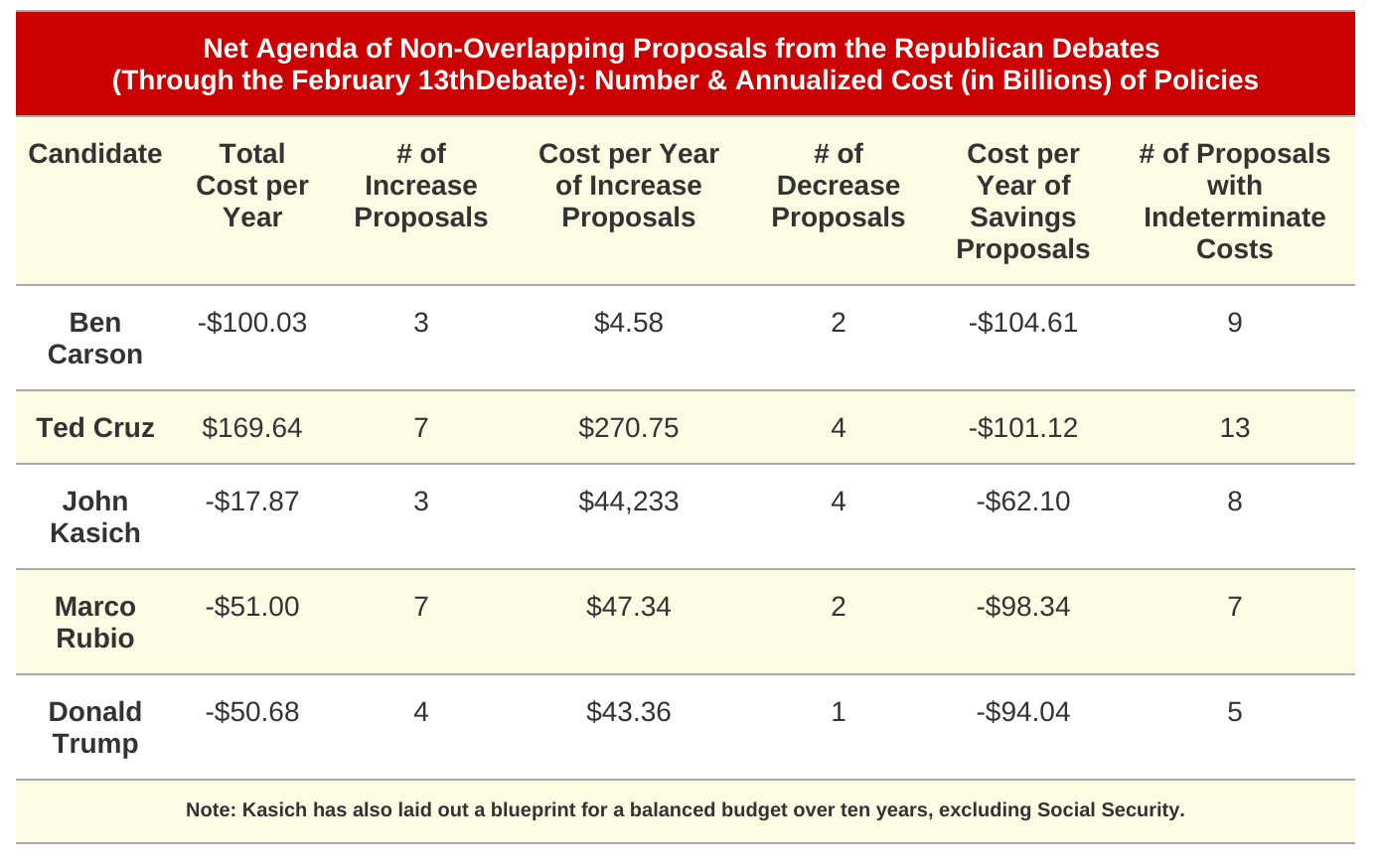Republican Fiscal Snapshot: Net Cost of Policies Proposals through the Debates
February 25, 2016
Demian BradyCANDIDATE:
Republican Debate AnalysisThe Taxpayer's Tab - Volume 8, Issue 05
The Republicans have now held nine debates (with another one scheduled for tonight) during which the five candidates left standing have made a combined total of 79 proposals that could impact spending. Four of the candidates would, on net, reduce outlays ranging from $18 billion to $100 billion per year while one would increase outlays by $170 billion, and each of them have several proposals whose costs or savings could not be determined. The table below summarizes the net change on spending resulting from their policy agendas as laid out in the debates.

Highlights:
- The largest net increases are specified in the area of defense.
- John Kasich’s proposal would lead to an annual $26 billion defense increase.
- Marco Rubio would return defense spending to 2012 levels, for an annual increase of $34 billion.
- During the debates, Ted Cruz has also called to “rebuild the military” but was unspecific on funding levels. He had previously supported anamendment in the Senate that would have increased the defense budget by $75 billion per year. But, Cruz has now clarified his defense plans. He advocates boosting military spending to 4.1 percent of GDP over his first two years in office, and then using 4 percent as a “guideline” for appropriate levels in subsequent years. Over the eight years from 2017 through 2024, this would lead to a yearly average cost of $263 billion over the Congressional Budget Office's defense budget projection. He promises to pay for the increase by boosting the economy and thus increasing tax receipts, implementing spending cuts (including his “Five for Freedom” plan), and by selling federally-owned property and assets.
- Ben Carson and Donald Trump propose to boost defense but have not indicated a desired funding level.
- After defense, the largest spending increase was proposed by Trump who would implement a one-time tax of 10 percent (lower than the current 35 percent federal corporate tax rate) to incentivize companies to repatriate earnings held overseas. Trump would use the funds ($32 billion per year) to increase federal spending on infrastructure.
- The largest savings would result from repealing the so-called Affordable Care Act. In the debates, each remaining candidate except Kasich vowed to repeal Obamacare, which would reduce outlays by $94 billion per year. The candidates still need to get more specific regarding the replacement reforms they would implement, and their potential costs.
- Donald Trump has offered the fewest spending related proposals (10) while Cruz issued the most (24).
- The annual price tag of Cruz’s debate agenda is now higher than Hillary Clinton’s ($150 billion) – though, of course the Democratic Socialist Bernie Sanders has proposed the most expensive agenda, costing over $1.7 trillion. Cruz has stated his “Five for Freedom” plan to eliminate several agencies and departments (with many details still to be worked out) would reduce spending by $500 billion over ten years. NTUF verified savings of $5 billion per year over the first five years. If the total savings were achieved, Cruz’s net agenda would drop to $125 billion per year in new spending. He has also called for additional reforms that could reduce outlays, including welfare reform, but the savings are indeterminate due to lack of specificity.



